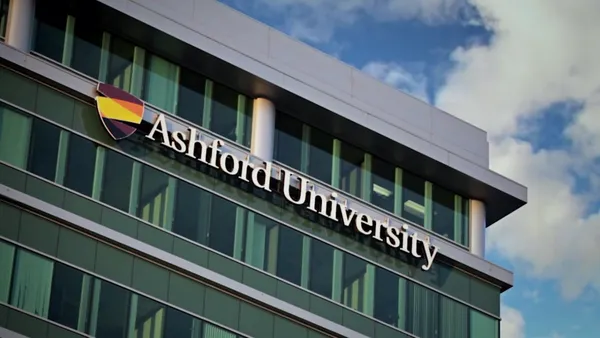Dive Brief:
- Zovio, a troubled educational services company, is taking steps to sell off its assets and shut down, according to a Tuesday filing with the U.S. Securities and Exchange Commission.
- The company's board is recommending that Zovio liquidate its assets and pay any remaining cash to shareholders after the company fulfills legal and other financial obligations. Liquidation would include selling Fullstack Academy for as much as $55 million, which would give the company up to $20.3 million to distribute to shareholders — though it said it could not make any guarantees.
- The announcement comes after Zovio terminated its services contract with its largest client, the University of Arizona Global Campus, and sold its tutoring services business, TutorMe. The dissolution plan will commence if a majority of shareholders give their approval.
Dive Insight:
Zovio, formerly known as Bridgepoint Education, used to own two for-profit universities that collectively brought in almost $1 billion in annual revenue in 2012. But as regulations around for-profit institutions tightened, the company attempted to transform into an educational services company.
That pivot began around 2018, when the company merged its two institutions, the University of the Rockies and Ashford University. The combined college retained Ashford’s name. The next year, Bridgepoint rebranded as Zovio and snapped up two companies: boot camp provider Fullstack Academy and tutoring platform TutorMe.
In 2020, Zovio sold Ashford to the University of Arizona, shedding its role as a for-profit college operator. The public flagship renamed the institution the University of Arizona Global Campus, or UAGC, and kept close ties with Zovio through a 15-year contract with the company. Under that contract, Zovio agreed to provide services such as marketing and recruitment in exchange for a cut of the online college's revenue.
However, Zovio’s pivot to an educational services provider unraveled quickly. UAGC enrollment sank during the first year — a continuation of a trend that had started under Ashford. The two parties ended their contract in August, with UAGC’s president saying that the university wanted greater control over its operations.
But those aren’t the only problems that have hammered Zovio’s bottom line.
Earlier this year, Zovio lost a lawsuit brought against it by the state of California, which accused the company of misleading students about its educational programs and career outcomes. San Diego Superior Court Judge Eddie Sturgeon cited evidence in his ruling estimating Zovio made 1.2 million misleading calls to prospective students from March 2009 to April 2020.
Sturgeon slapped Zovio with a $22.4 million fine. The company took out a loan of $31.5 million to pay the fine, according to SEC documents. It then sold its TutorMe business for $55 million in cash and used the proceeds to pay off the term loan.
Zovio filed an appeal in the California lawsuit over the summer.
Chief External Affairs Officer Vickie Schray did not respond to a request for comment Wednesday. When Zovio terminated its contract with UAGC, it gave the university the right to receive any refund from the $22.4 million fine Zovio could win in its appeal, according to its Tuesday’s SEC filing.
Fullstack Academy is Zovio’s one remaining business. The company expects it can sell the boot camp provider for between $34 million and $55 million.
So far, some buyers, including private equity firms, have shown interest in Fullstack Academy. But Zovio’s management believes it may not be possible to complete a transaction with one of these buyers before the company runs out of cash, according to the SEC filing.
Zovio officials believe that dissolving the company gives it the best chance to sell the remaining business and other assets.
At the end of August, Zovio had about $63.2 million in assets. About $19.7 million of that amount was goodwill, an intangible asset that may include a company’s brand reputation, loyal customer base or positive employee relations.
Before Zovio can distribute money to shareholders, it must settle remaining liabilities on its balance sheet. The company estimated it would be on the hook for $2 million in payroll and operational spending in September and October. It also predicted it would cost about $40.3 million to sell Fullstack, including $19.5 million for employee severance and $5 million in debt payments.
It also will have to pay lease obligations for its offices and insurance policies.














